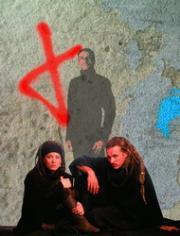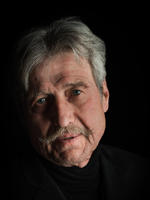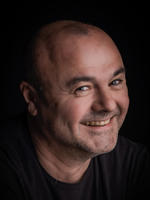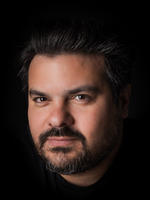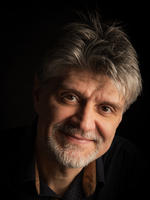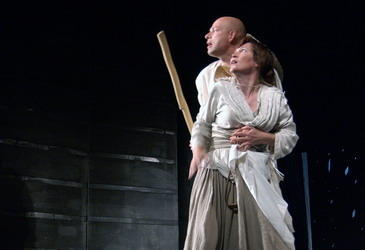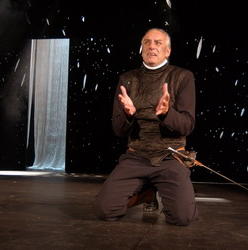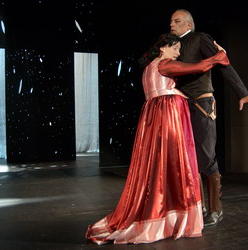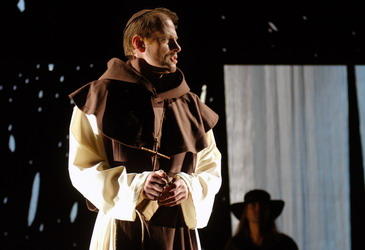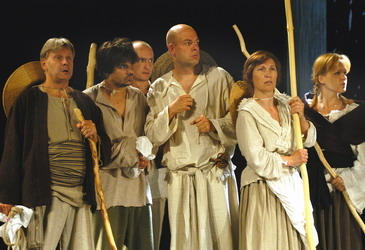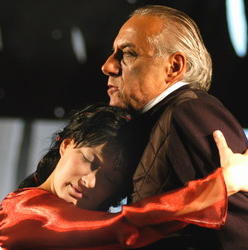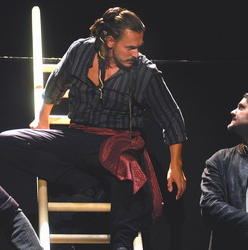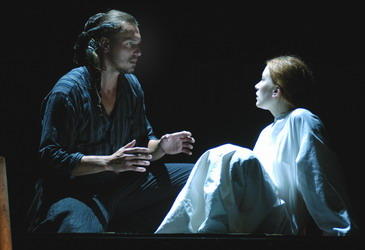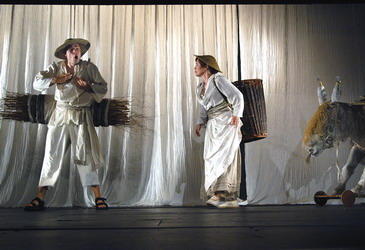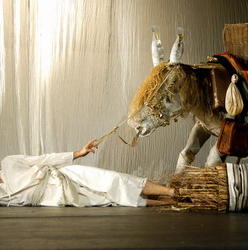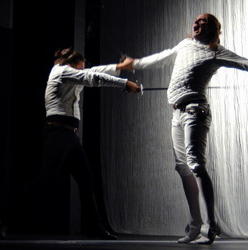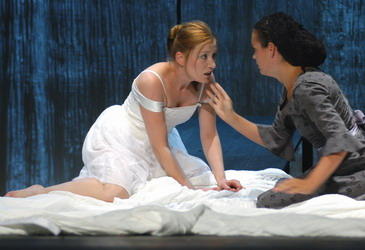Franz - Music, Petrol, Thrill
Luboš Mareček 21. March 2006 zdroj MF dnes
The public knows the interesting composer and original artist Vladimír Franz mostly due to his tattoo. But the distinctive artist has also other qualities than a lot of ornaments covering all his face and hands. At the weekend Franz was awarded his fourth Alfréd Radok’s Award for scenic music. This time, for the music to The Devotion of the Cross performed in the Brno City Theatre.
The Baroque thriller – as the drama in verse by famous Spanish dramatist Calderón is called by the Brno City Theatre in its advertising materials – is an example of exceptional performance. In this case, artistic demandingness does not mean spectator’s non-digestibility. “Thanks to the professional background in Brno I could give the music a good cuddle,” awarded Franz, combining the sound of organs and madrigals in the production, remembers. Disquieting, even mystic tones and songs from Franz’s workshop enriched the production with pathos and a spiritual dimension.
How did you get to the cooperation with stage manageress Hana Burešová and what does it mean for you?
After The Demons and Macbeth it is our third cooperation. For me, Burešová is a rolls royce of the Czech stage management, she is my depth and safety. At the same time, she does not owe anything to the time and does not feel any need to fly into the air with some useless directorial gestures. Her stage management is very healthy, which may be related to her Chod origin.
You compose music for theatres all over the country. Is Brno any special stop for you?
My great grandfather came from Brno. Furthermore, I established contact with the Ars Brunensis Chorus which is the best Czech interpreter of my choral work. The Brno City Director Stanislav Moša created for the producers conditions comparable to those of West European theatres. The author may give the music a good cuddle there.
“Radok” for Music Is in Brno
Jan Šmikmátor 20. March 2006 zdroj Rovnost
On Saturday Alfréd Radok’s Awards were awarded in the Prague Theatre Na Vinohradech. Brno received one of them.
The dramatic notables from the entire republic came to the Prague Theatre Na Vinohradech on the eighteenth March evening. The art agency Aura-Pont awarded prestigious Alfréd Radok’s Awards there for the fourteenth time. Brno had five nominations. Finally, Brno received one award – for the music to The Devotion of the Cross performed in the Brno City Theatre. The award was received by composer Vladimír Franz.
“I was pleased with Vladimír Franz’s award very much, he is a brilliant composer,” Stanislav Moša, director of the Brno City Theatre revealed his contentment. Further cooperation with Franz is being negotiated.
The Devotion of the Cross was also nominated for the performance of the year and actress Helena Dvořáková was nominated for the best performance. But director Moša is not sorry for these not awarded nominations – the Brno City Theatre was the second out-of-Prague theatre (after Klicpera’s Theatre from Hradec Králové) as for the number of nominations.
Brno Fights for Radok
Jan Šmikmátor 17. February 2006 zdroj Rovnost
Nomination to the Alfréd Radok Award fell out well for the Brno theatres. Two plays performed in Brno have a chance to gain the Alfréd Radok Award for the production of the year. The Alfréd Radok Fund announced nominations to annual prestigious awards. The final evening transmitted by the Czech television will take place in the Vinohrady Theatre on 18th March.
Devotion of the Cross and Greek Passions. These two plays were nominated to the Alfréd Radok Award yesterday. The first of them opened the Brno City Theatre season in September, the other was on the Janáček Opera at the beginning of the year 2005.
“It is an enjoyable feeling, I am proud of my people,” director of the Brno City Theatre Stanislav Moša expressed his pleasure and disclosed that the theatre was preparing another performance with the stage manageress of the successful play Hana Burešová. “It will be the first premiere of next season, the comedy Amphitrion by Heinrich von Kleist,” Moša said.
The Devotion of the Cross is an ardent iron in Radok’s fire, it has collected three nominations in total. Besides for the performance itself, also for the music by Vladimír Franz and for the interpretation of Juliet by Helena Dvořáková.
“It is a great honour to me that somebody has appreciated my work like this,” Dvořáková admitted modestly. She does not dare to guess her chances for the award among other actors. “I have just started to rehearse in Prague, so I have the opportunity to see the huge competition there, so I do not know how it will come out,” Dvořáková says.
The Brno City Theatre has another nomination - Miloš Štědroň will fight for the award for the best music with the musical Nana. Moša is negotiating further cooperation with him too.
TV Staff Settled Down in the Theatre
15. February 2006 zdroj Haló noviny
The Czech premiere of The Devotion of the Cross written by Calderón de la Barca, started the current dramatic season of the Brno City Theatre last September. Though the philosophical scope of the drama ranks it among more fastidious pieces, it has found its spectators very soon: not only in Brno, but also in the Prague Theatre Na Vinohradech where it was guest-performed in last December.
Stage manageress Hana Burešová was called the Personality of the Month in the Divadelní noviny (Dramatic Paper) for her work on this production. According to critics the Brno presentation brings what “the Czech theatre is missing legibly - passion, pathos and a spiritual dimension”.
An important role of the drama which does not lack mystic, Christian and demonic features is played by the symbol of cross that may be interpreted as Kain’s sign as well as a mysterious promise of happiness and reconciliation. Uncontrollable physical and spiritual passion, desire for justice, heroic interpretation of honour and justice, dark criminality, blind hate, desire for revenge and omnipresent unlimited determination mingle with clownery and the plebeian interpretation of “high ideals”.
The drama, which may resemble Daněk’s plays with its construction in the modern stage production, is full of antitheses, heroes are full of discrepancies, the story is governed by passions, loves and cruelties. Thus, to be said in modern terms, it is an artistic and convincing “thriller” with strong moral aspects. Its storyline is gripping: it includes unexpected turns, disclosures, murders, and even an incest – if only an exciting plot full of violence and action dynamics were taken into account. However, it is also a story of wandering of human soul, looking for identity, opening eternal themes of crime and punishment, or free will. “Who is really guilty”?- a spectator leaving the theatre may ask.
The brilliant translation by Vladimír Mikeš coped with the pitfalls between the elegant diction and natural dialogues, corresponding to a somewhat mysticizing, but functional stage setting by Milan David and costumes by Hana Fischerová. An important role is also played by Vladimír Franz’s music.
Stage manageress Hana Burešová, with the dramatic assistance of Štěpán Otčenášek, chose Petr Štěpán, Helena Dvořáková, Ladislav Kolář and Igor Ondříček for principal roles. They share the development of action with Irena Konvalinová, Jan Mazák, Alan Novotný, Tomáš Sagher, Viktor Skála and others. The production will be put on the stage of the Brno City Theatre on 17th February. The Brno staff of the Czech Television will be present to film this significant feat.
Baroque Mystique Can Chime With the Present
Vít Závodský 23. January 2006 zdroj Rozhlas weekly
Stage manageress Hana Burešová proved her detailed understanding of the specific symbols of the Spanish “Golden Age” as for the spiritual and aesthetic side and can approximate it convincingly to the throwaway faithless present time in cooperation with dramatic adviser Štěpán Otčenášek. She coped with the pitfalls of the artwork with a humble belief in it – from sometimes rather breakneck but substantiated turns of the storyline of this “thriller” full of bursting passions, crimes and cruelties, across the multivalued symbolism of the cross or the pathetic but natural interpretation of noble octosylabic verse, up to the final mystic extasy of redemption. Scene designer Milan David concretized the stage with the combination of shifting black panels, various textiles and lights in the spirit of period painting. Costumes and dreadlocks by Hana Fischerová opened “Jarmuschian” connotations of the Samurai Code of Honour; The organ and choir score by Vladimír Franz enhanced culminations of action. The performance balanced in all components avoided the danger of stiff declamation as well as external effects or unsuitable updating. Action scenes of duels, chasing, brigandages and the final lynch are suitably stylized choreographically, the contrast comic line of opportunistic villagers headed by Gil (Viktor Skála) is inspired by the comedy delľarte. The painful experience of protagonists’ inside struggle is visualized expressively, but suggestively and without cramp, by a pair of incest lovers - Petr Štěpán (Eusebio revealing his mysterious origin) and Helena Dvořáková (Juliet suffering from fatal conflicts). The performances of Ladislav Kolář acting authoritative father Curcio who caused the evil and Igor Ondříček playing Lisard and priest Albert may be characterized similarly.
The excellent first Czech production of Calderón’s parable (presented to the Prague audiences too) was announced the second best production of the year 2005 in the inquiry of Divadelní noviny (Dramatic Paper). It not only opposes to prejudicial opinions on the commercial character of the Brno City Theatre repertory, but it offers the catharsis of self-examination to a meditative spectator.
Baroque Miracle in Atheistic Prague
Vladimír Just 13. December 2005 zdroj Kulturní týdeník
There are dramatic “values” which dominate cultural columns, achieve high scores in public inquiries, on-line interviews are made with protagonists for various portals, coloured social (i.e. a correct circumlocution of the adjective “popular”) magazines and supplements. “Scissorhand” Otakar Svoboda or another of his colleagues of ČT1 hurry then regularly with an unfailing sense of these shootings stars with a single sentence “comment” in Events in Culture (where the words “interesting” or “pleasant” are declined up to their absolute semantic depletion as perhaps the only evaluating criteria known to the authors). The respective Event is thus recorded, processed and the cultural industry is steaming ahead. Then there are more inconspicuous values which are not talked about as they do not show a sufficient degree of celebritiness for functionaries of the media apparatus. Then it is almost a miracle when these values, expressing however the rate of our culture, can find its audience. Such a little miracle – owing to its almost zero previous advertisement – was for me the guest performance of the Brno City Theatre, full of excellent actors, unfortunately unknown in Prague, presented in the Vinohrady Theatre on Sunday 11th December 2005. They presented Calderón’s play Devotion of the Cross written in the year 1636 (stage managed by Hana Burešová, music by Vladimír Franz, stage design by Milan David, translation by Vladimír Mikeš, who also wrote unique essays about Calderón included in the programme brochure).
I already saw the performance in September 2005 on the mother stage when the warm acceptance of its premiere sharply contrasted with its later wishy-washy review in the LN (Popular Paper), whose authoress did not apparently know what to do with Calderón and his Christian mysticism. Thus, I was a little afraid of its acceptance in rather “more atheistic” Prague because the intimate poetic drama of several figures, mostly built on the symbolic value of verse and its rhythm, could lose a lot of its magic by transfer to a larger space. Especially when it is played on a minimalist, temple-like strict scene working with a simple black-and-white contrast of light and dark (white or bluish columns of light in which the key scenes are played, including the “ascension” of the heroine, the contrast dark costume of authoritative father Curcio, white costumes of popular and aristocratic figures, black dresses and silhouettes of nuns against the white background). From the beginning, impressive graphic details come out more efficiently from the austere scene (the dummy of an ox in the introductory forestage in the style of a popular theatre, the white ladder at the black wall of convent, then put fatefully aside, clubs of villagers as symbols of the cross, and the thorn covering the killed hero). Surprisingly, none of my fears of the loss of fragility did not come true in the Vinohrady Theatre: the Brno actors not only filled the space well with their speaking and motion without losing the driving force, which is a tireless trochee, but the performances of some actors matured since the premiere. This also applies to the figures whose motivations are most distant from ours. So Ladislav Kolář in the difficult role of inquisitional-authoritative father Curcio, whose ostentatious bigotry also results from his uneasy conscience of formerly hot-tempered, jealous man obsessed with a murder, proved, to be said with a more modern classic, that impossible became true: he played realistically almost unplayable scenes and turnovers of the figure. (Two examples: When father who wants to avenge for the murder of his son and the profanation of his daughter meets the offender, he suddenly feels affection for him – the spectator already knows that the offender is his son, but father does not and cannot know it; at the end, after Curcio gets to know the mysterious sign of the cross, which prevented the siblings in the convent from incest at the last moment, father’s aversion to her repentant daughter Juliet is equally irrational.) Besides Petr Štěpán, who is brilliant in the central figure of lover, rebel and Christian Eusebio, the greatest performance of the night matured in Helena Dvořáková’s presentation of Juliet. It also had to be a problem for her to forget of Stanislavski and find logic in irrational transformations of a loving aristocratic daughter into a sulking nun and then, after she was refused sexually, into a sex-starved, murdering beast, and then into repentant Maria Magdalena at the end. And she managed it finally – at least for those in the auditorium (according to the final applause they were in majority) who are willing to accept the antirealist logic of baroque theatre of the 17th century. It is not so far from the absurd logic of antitheatre of the end of the twentieth century and the beginning of the twenty-first century. And third, Viktor Skála did not overplay his opportunist Gil (representative of comic counterpoint of the play) so much as well, weighted out the tragicomedy of a little man in a large world exactly, without traces of pandering. His gags brought in the tragicelness of the story not only the necessary “light time”, but also a current overlap to the present. While an average contemporary gets used to the thinking of proud Eusebio and other Calderón’s heroes with difficulties, he need not get used to countryman Gil or his impertinent wife Menga (excellent Irena Konvalinová). This plebeian thinking – even with its possible results, up to bloody pogroms, as the performance shows – remains the same in Calderón’s, Havel’s or Dürrenmatt’s time...
All is Mercy Sounds Sincerely in the Devotion of the Cross
Josef Mlejnek 18. November 2005 zdroj MF dnes
Stage manageress Hana Burešová confirmed again in Calderón’s play that she can fully manage a religious theme
Stage manageress Hana Burešová trained the drama Devotion of the Cross written by Spanish classic Pedro Calderón (1600-1681) in the Brno City Theatre. The fates of protagonists resemble in many things the story of Sophocles’ king Oedipus. Protagonist Eusebio lives, without being aware of it, under a foreign “identity”, kills his brother in a duel – he almost kills his own father and commits incest with his twin sister.
It holds in this Calderón’s play that “life is a dream” we are wandering in, looking blindly, and awaking from as late as in the death which means resurrection for a Christian. Albert Camus, who created about fifty years ago an adaptation of the Devotion of the Cross in Paris, was fascinated with the provocative way in which Calderón expressed and illustrated three hundred years before Bernanos the deep truth that “all is mercy” which is a response of catholic writer to our faithless objection that nobody is fair-minded.
Hana Burešová could apply the comic as well as the serious position of her directorial talent in the production. As one of a few stage managers in this country she is able to understand very sensitively and exactly the seemingly outdated religious theme and present it to the audience in a large scale of unshaved dramatic speech. The result is a great dramatic opera, extraordinarily successful and dynamic intersection of word, motion and space. And also music whose author is Vladimír Franz.
The scene is simple, severe, an isolated world of convent can be seen above on the background, a stylized forest decoration appears in scenes with robbers. Petr Štěpán as Eusebio and Helena Dvořáková acting Juliet managed their very difficult pathetic dialogues and monologues without any trace of fitfulness or overplaying, which is not easy, just due to the complicated structure of the text. Ladislav Kolář plays the role of aristocrat Curcio very well, but his gestures miss now and then the move necessary for a perfect plasticity and credibility of what he says. Inspiration by El Greco’s pictures is not felt only in costumes of the Brno performance, as not only an external stylization is in question, but also in the total approximation of the spirit of Calderón’s and El Greco’s time.
Starting from the noble fencing duels which are “just” continuations of disputes and dialogues by other means, and terminating for example with the death of Eusebio, who leaves this world after his criminal peripetias pardoned in the Christ’s cross and reconciled with himself.
A special tension in the performance results from the difference between the interpretation of religiousness in Calderón’s time and our ideas which are sometimes very distant. It is to the stage manageress’ credit that she did not simplify her work with “putting down” or other post-modern ingredients. The lightening comic side of the drama is represented by villagers who are not completely positive like their most expressive representative Gil (Viktor Skála): they add to a strong side and are brave only in a horde.
Devotion of the Cross Results in a Mystic Ecstasy
Vladimír Čech 22. September 2005 zdroj Hospodářské noviny
It is sometimes said about the Brno City Theatre that its dramaturgy courts popularity of audiences. But this statement may be easily opposed just with the enumeration of titles which are definitely not the most digestible bites. Besides, the season which has just started is carried in token of Czech premieres, which proves that the Brno City Theatre walks rather along untrodden paths. This month, a Czech premiere of Devotion of the Cross written by Calderón de la Barca (1600-1681), Madrid native, was put on the stage.
From the purely presentation viewpoint, stage manageress Hana Burešová (guest) was unequivocally successful. In fact, the play with all modern or timeless design did not lose anything of its patulous Baroque pathos and noble majesty. If the play is first of all about the fact that an individual life is worth nothing in the conflict with honour as understood in the Baroque time, then, if you want this idea to become apparent, it must not be suppressed anyhow, and it is not.
Milan David’s stage design, though simple and indicative, is very poetic. Sometimes white curtains will do, another time black panels plus decent, but always somewhat calculating lighting – this all creates an adequate space for more or less hidden, wild and uncontrollable passions of body and soul.
The total stifling atmosphere of the drama, lightened somewhat by performances of a couple of uncouth villagers, Gil (excellent Viktor Skála) and his wife Menga (Irena Konvalinová), is underlined markedly by Vladimír Franz’s music when the sound of organ, choir and other instruments give to ears what is given to eyes.
Experience to the marrow of your bones
However, stage manageress Hana Burešová with her team could design most original production concept but everything would go astray and it would be boring if she had not capable actors to pay interest on her original endeavour. The protagonists’ performances give real human dimensions to the figures, they are not just bearers of inanimate characters construed and pointed in a Baroque way. That is why they will also touch you. The actors live their figures to the marrow of their bones and you believe them even if their ecstasy is changed into cramp.
Petr Štěpán as Eusebio enriched his gallery of lacerated young men with the type to whom are peculiar most sharp turns in behaviour provoked by irreconcilable dissacord of passions and conviction. His Eusebio is a hothead out on a limb, but a spectator believes him his boyish rebeliousness as well as his final exalted resignation and forgiveness. Visually Štěpán appears somewhat like a samurai (costumes by Hana Fischerová), which enhances the rebelliousness and self-madeness of the figure. Curcio and Juliet in the highly suggestive performances by Ladislav Kolář and Helena Dvořáková, respectively, experience similar “schizophrenic” transformation. From the other creations let me mention Igor Ondříček in the role of Lisardo, Juliet’s brother, who becomes later personificated murderer’s confessor Albert.
Calderón’s Devotion of the Cross is the first but really not fruitless meeting of this classic of Spanish drama for many people as the performance forces you to not remain cool but to take a stand according to your nature.
Courage to Pathos and Severity
Roman Sikora 19. September 2005 zdroj Literární noviny
It is rarely possible to meet such a closed form, so firmly stage-managed since the beginning till the end, within the Brno theatre and, perhaps, within the entire Czech theatre as in case of the new performance of Calderón’s Devotion of the Cross stage-managed by Hana Burešová (guest) in the Brno City Theatre.
Hana Burešová worked with an almost empty space where stress was laid first of all on dramatic performances, rigid sculpturesque arrangement of classicizing style, and on the art of expressive declamation of Calderón’s rhymed verses. The verses surely tempting to a mechanical spouting. But in this case, the sense was strictly sought for and the actors (Petr Štěpán, Helena Dvořáková, Ladislav Kolář and Igor Ondříček) are able to keep the attention of audience in rather large introspective monologues. And this is mainly due to their resolution to stake themselves completely and the text, which could easily slip to self-parody, is literally forced upon audiences under the fine stage management. Theatre-visitors are forced to listen to and hear the poetic pictures and metaphors included in the text which exceed the plot quality. Of course, only such theatre-visitors (and reviewers) who did not come to the theatre to be fed with video effects and who do not regard the stylized and stressed stage speech as a ballast and are not forced with their conditioned reflexes to expect of the theatre something similar which is commonly offered by television in the most blatant form. Finally, what else can the theatre offer in competition with the television and the film but a stage poem which requires to calm souls scatterbrained with general haste. However, theatre-visitors must be forced to that. And it is not always possible. It is only possible through a conceived and consistently synthetic form, modelled by the stage-manager in active co-operation with the other creators of the performance who stop thinking for a while that audiences should laugh above all.
A significant role in the performance is also played by Vladimír Franz’s music and discordant, disquieting fragments of the mixed choir Ars Brunensis Chorus. Except the ordinary fulfilment of entr’actes during miner changes of the stage space, although it is the music of masterful manuscript at first hearing, it enters the act actively, comments and underlines the places of dramatic turns, completes dramatic performances and creates the space for them.
The stage management does not use more expressive entrances very much. It also saves impressive actions which often look artificial and unfilled on the stage when they try to be realistic. Combats, fights and the closing lynch of the “people’s enemy” are just indicated in motions. Several real and suggestive metaphors even appear. For example, when Juliet’s dead brother is brought, father throws Juliet (originator of the murder) angrily on his dead body. Juliet gets up with her brother’s blood on her white underskirt.
Although the performance, like any tragedy, oscillates permanently and unintentionally on the edge between tragedy and farcicality, borne by a brave pathos, it will not slip down. Mainly due to the comic scenes of commoners such as Gil acted by Viktor Skála whose task is not only to entertain theatre-goers and lighten the action, but firstly to delimit the borders between comedy and tragedy. And also with the support of dramatic performances and especially the stage management who can overcome rather controversial and schematic final reconciliation in death and forgiveness of sins with its consistent form.
In fact, the performance is very conservative in ideas, almost not related to the present. And religious. But very impressive. And consistent. And non-instant.
The Scene Is Dominated With a Geyser of Murders And Fornication
Jiří P. Kříž 13. September 2005 zdroj Právo
The Brno City Theatre Brought Calderón’s Devotion of the Cross to the Czech Republic
Brilliant stage-manageress Hana Burešová and charismatic musician Vladimír Franz met in the Brno City Theatre to work together on the Devotion of the Cross written by Spanish Pedro Calderón de la Barka and translated by Vladimír Mikeš.
And a masterful team of actors appeared on the stage. This all promised a strong dramatic experience in the Czech premiere of the play written by the greatest Baroque master. I should say – a story on the journey from Shakespeare maybe to Schiller, and even farther: to the present action drama. In the Devotion of the Cross there is everything. Unclear origin of the hero who becomes an outsider in the society, a stormy love, parent’s disagreement impeding marriage, death in a duel, outlaw’s life, jealousy, pillage, murders, fury, fornication, incest, hate, revenge...
Franz is a music genius
But it would not be Calderón if he did not put there looking for God, his happy discovery, forgiveness and reconciliation. Devotion, God’s will and miracles are values for which the present generations of theatre-visitors only know a fragment of Calderón’s work – mostly just Life is a Dream. Coincidentally, the foregoing play along with the Devotion of the Cross were written in the author’s top creative period (1636).
Burešová utilized perfectly the potential and possibilities of one of the most professionally managed and working theatres in Central Europe. More like just for herself she reminded of her own ways out in the comedy delľarte, mainly in the scenes of provincial fumbler Gil (Viktor Skála). The story was conducted in dark Bruegelian twilight contours of large-screen scenic pictures.
Scenographer Milan David, costume designer Hana Fischerová, and first of all already mentioned Vladimír Franz, capable of a brilliant connection of modern instrumental and imaginative music inspiration with symphonic Baroque harmonic units dominated by organ chords and melodies, supported the stage-manageress’ intent.
Dvořáková and Štěpán are dominating
Passions rage on the stage, mainly in relations of the central pair, Eusebio acted by Kříž (Petr Štěpán) and Juliet (Helena Dvořáková). The performances of the both actors correspond perfectly with the directorial intent and with the stressed romantic line of damnation of the unhappy lovers, confounded outlaws. Ladislav Kolář (Juliet’s father Curio), Igor Ondříček (her brother Lisandro and priest Alberto) and others keep pace with the protagonists.
You need not go to Calderón’s Devotion of the Cross like to a mass. But it is very good that we have finally the possibility to get to know it. Really, it is more suggestive now and then than Shakespeare as I have read in a promotional slogan.
The Brno City Theatre Started the Season With a Tragic Story of Fated Lovers
Simona Polcarová 13. September 2005 zdroj Rovnost
A tragic story of fated lovers, uncontrollable passion, faith and providence started a new season in the Brno City Theatre at the weekend. The first premiere was Calderón de la Barka’s Baroque drama Devotion of the Cross which appeared for the first time on the Czech stage.
The drama is a sequence of pictures
Stage-manageress Hana Burešová respects the tragic character of the story and the moral fighting of characters. Besides the fated love, the most important thing for her is the unbalanced mind of Eusebio, putting a foot between the journey of honour and crime, and the internal fight of fiend Curcio. The heavy drama is enlightened with the calculating couple of villagers, Gil and Mengy.
The stage manageress’ effort is crowned with the stage design and music
Juliet’s and Eusebio’s parts became a well utilized opportunity for Helena Dvořáková and Petr Štěpán. Dvořáková feels internally the fate of her character, in Štěpán, fighting with his character contends with Eusebio’s disorderliness. The atmosphere of the performance is enhanced under any circumstances with the symbolic and eloquent scene designed by Milan David (guest) and the music by Vladimír Franz, underlining the key moments and sacral motives.
Personality of the Month / Hana Burešová
1. December -1 zdroj Divadelní noviny
Stage manager Hana Burešová cooperating with dramatic adviser Štěpán Otčenášek devoted the same intensive care to Calderón’s Devotion of the Cross as to the masterpieces presented on her mother stage in the Prague Theatre in Dlouhá Street. She not only enriched the Brno scene repertory with the remarkable and demanding title, revelatory in our conditions (mostly neglecting the great Spanish dramatic poet), but she also managed to enforce the scenic efficiency of the Baroque showiness and emotionality in a completely different cultural context. This is especially to the merit of the well thought out dialectic coaction of all artistic components dominated by Vladimír Franz’s music, beside the central trio of characters, supporting copiously overlapping human fates. In the time when sterile coolness is adored, the Brno performance brings what is missing in the Czech theatre: passion, pathos and a spiritual dimension.
Calderón’s Devotion of the Cross in the Brno City Theatre
im 1. December -1 zdroj Kult
The starting premiere of the new season in the Brno City Theatre was Calderón’s drama Devotion of the Cross stage managed by Hana Burešová. It is a tragedy of unfulfilled love and honour, a story about wandering of soul and looking for one’s own identity full of passion, cruelty and desire of vengeance. The cross is a symbol, protection and a milestone. Brilliant and impressive dramatic performances of the protagonists headed by Petr Štěpán (Eusebio) and Helena Dvořáková (Juliet), perfect stage management and permanently thrilling story. The production team Burešová-Otčenášek (dramaturgy), David (stage design), Fischerová (costumes) managed to create a tasteful dramatic piece which will undoubtedly attract the majority of regular as well as occasional theatre-goers. Moreover, the old Baroque story is not so far from the thinking and feeling of the present world.
Passion and the Cross
Zdeněk Hořínek 1. December -1 zdroj Divadelní noviny
The original title of the performance is La devoción de la cruz, i.e. Devotion of the Cross, which indicates a religious, moral and especially fatal mysterious function of the symbol. The twenty-year-old translation by Vladimír Mikeš became an excellent basis for the present performance: it interprets objectively and clearly somewhat a distant matter, giving her the validity of timeless existence, an occasional rhyme appears as an unintrusive matter-of-course and the pathos of impassioned effusions never falls in smooth rhetoric.
Stage manager Hana Burešová (guest), who has already encountered Calderón’s masterpiece (The Wonder-Working Magician), had to resolve particularly two production problems: to find an admissible expression for the eccentric story in a strange mixture of genres and for the extreme manifestation of human passions at the boundary of guilt and punishment, good and evil, life and death. The Baroque escalated dialectic of situations, moods and attitudes is reflected in the coordination of all the means of expression, starting from the stage design (changeable combinations of white and black in curtains, coulisses and costumes) and ending with the imaginative style of acting. Combats take place in choreographic hints, the war turmoil is evoked with the confused running of warriors accompanied with the movement of black coulisses, performing additionally the role of claudelian partitions, walls, ramparts – tools and signs of hiding, separation, imprisonment. Frequent monologues are interpreted as large replicas, listened to carefully by a motionless partner (this reminded me of the deep experience I had from Vilar’s performances of French classic) and the speaker presents its testimony as a suggestive dramatic process. Vladimír Franz’s music evokes a charged atmosphere with gradual sounds, phrases stage events and underlines situation points with sharp attacks, supports the transcendental dimension of human fates on spiritual peaks with noble tones of organ and choir songs.
However, the precondition of success consists in the three decisive dramatic forces of the play: lover, father and his daughter. Petr Štěpán is sufficiently endowed for his task: with his well-built figure, penetrating look, short temper, and swift emotional changes he expresses Eusebio’s steadfast virility as well as his oscillation between passion, tenderness and anger. Curcio (Ladislav Kolář) is presented like an incarnate authority, decisive, ironhanded and cruel. His stiff, straightened posture breaks only at the moments when he remembers his deceased wife – as if he felt his guilt in the past and posthumous jealousy, the cause of the sad fate of both his children who, unaware, fell in the incestuous love with each other. Helena Dvořáková made Juliet a centre from which intentions of both male players are reflected. In her female fervour she had to mobilize really male resolution to maintain the unstable balance of forces and act as a sensitive resonance board of the situation at the same time. She is the most coherent expression of the typically Baroque paradox of magnitude and misery of human destiny. Proud and rebellious in justified claims of her amorous passion – when humiliated she creeps the earth like a worm.
The question of Calderón’s work validity in the present conditions cannot be answered by vulgar references to ephemeral current affairs. Eternal, existentially rooted human dilemmas are always valid everywhere, casting doubt upon the term of topicality itself. Just the certain remoteness of Baroque consciousness and conscience, extreme Baroque emotionality and sensibility can have a provocative effect, can surprise and exasperate, but is highly theatrical. The theatricality is not satisfied with an obligatory accumulation of negative phenomena, but can light the horrors of human fates with flashes of light represented by the symbol of the cross in the play.

